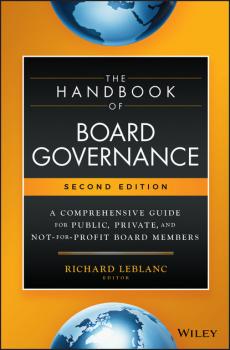Корпоративная культура
Различные книги в жанре Корпоративная культураCorporations and Citizenship
President Theodore Roosevelt once proclaimed, «Great corporations exist only because they are created and safeguarded by our institutions, and it is therefore our right and duty to see that they work in harmony with those institutions.» But while corporations are ostensibly regulated by citizens through their governments, the firms in turn regulate many aspects of social and political life for individuals beyond their own employees and the communities that support them. Corporations are endowed with many of the same rights as citizens, such as freedom of speech, but are not themselves typically constituted around ideals of national belonging and democracy. In the wake of the global financial collapse of 2008, the question of what relationship corporations should have to governing institutions has only increased in urgency. As a democratically sanctioned social institution, should a corporation operate primarily toward profit accumulation or should its proper goal be to provision society with needed goods and services? Corporations and Citizenship addresses the role of modern for-profit corporations as a distinctive kind of social formation within democratic national states. Scholars of legal studies, business ethics, politics, history, and anthropology bring their perspectives to bear on particular case studies, such as Enron and Wall Street, as well as broader issues of belonging, social responsibility, for-profit higher education, and regulation. Together, these essays establish a complex and detailed understanding of the ways corporations contribute positively to human well-being as well as the dangers that they pose. Contributors: Joel Bakan, Jean Comaroff, John Comaroff, Cynthia Estlund, Louis Galambos, Rosalie Genova, Peter Gourevitch, Karen Ho, Nien-hê Hsieh, Walter Licht, Jonathan R. Macey, Hirokazu Miyazaki, Lynn Sharp Paine, Katharina Pistor, Amy J. Sepinwall, Jeffery Smith, Jeffrey L. Sturchio, Greg Urban.
Corporation Nation
From bank bailouts and corporate scandals to the financial panic of 2008 and its lingering effects, corporate governance in America has been wracked by crises. Amid a weakening system of checks and balances in which corporate executives have little incentive to protect shareholder interests, U.S. corporations are growing larger and more irresponsible at the same time. But dependence on corporate profit was crucial to the early republic's growth, success, and security: despite protests that incorporated business was an inefficient and potentially corrupting system, U.S. state governments chartered more corporations per capita than any other nation—including Britain—effectively making the United States a «corporation nation.» Drawing on legal and economic history, Robert E. Wright traces the development and decline of corporate institutions in America, connecting today's financial failures to deteriorating corporate law. In the nineteenth century, checks and balances kept managerial interests aligned with those of stockholders, and public opinion grew supportive as corporations raised billions of dollars to finance infrastructure such as transportation networks, financial systems, and manufacturing operations. But many of these checks and balances were dismantled after the Civil War, creating a space for the managerial malfeasance that spiraled into economic crisis in the twenty-first century. Bolstered with archival and original data, including the first complete count of American business corporations before the Civil War, Corporation Nation makes a compelling argument for improved internal governance and more effective external government regulation.
Public Capitalism
In modern capitalist societies, the executives of large, profit-seeking corporations have the power to shape the collective life of the communities, local and global, in which they operate. Corporate executives issue directives to employees, who are normally prepared to comply with them, and impose penalties such as termination on those who fail to comply. The decisions made by corporate executives also affect people outside the corporation: investors, customers, suppliers, the general public. What can justify authority with such a broad reach? Political philosopher Christopher McMahon argues that the social authority of corporate executives is best understood as a form of political authority. Although corporations are privately owned, they must be managed in a way that promotes the public good. Public Capitalism begins with this claim and explores its implications for issues including corporate property rights, the moral status of corporations, the permissibility of layoffs and plant closings, and the legislative role played by corporate executives. Corporate executives acquire the status of public officials of a certain kind, who can be asked to work toward social goods in addition to prosperity. Public Capitalism sketches a new framework for discussion of the moral and political issues faced by corporate executives.
Corporate Governance Failures
Corporate governance, the internal policies and leadership that guide the actions of corporations, played a major part in the recent global financial crisis. While much blame has been targeted at compensation arrangements that rewarded extreme risk-taking but did not punish failure, the performance of large, supposedly sophisticated institutional investors in this crisis has gone for the most part unexamined. Shareholding organizations, such as pension funds and mutual funds, hold considerable sway over the financial industry from Wall Street to the City of London. Corporate Governance Failures: The Role of Institutional Investors in the Global Financial Crisis exposes the misdeeds and lapses of these institutional investors leading up to the recent economic meltdown. In this collection of original essays, edited by pioneers in the field of fiduciary capitalism, top legal and financial practitioners and researchers discuss detrimental actions and inaction of institutional investors. Corporate Governance Failures reveals how these organizations exposed themselves and their clientele to extremely complex financial instruments, such as credit default swaps, through investments in hedge and private equity funds as well as more traditional equity investments in large financial institutions. The book's contributors critique fund executives for tolerating the «pursuit of alpha» culture that led managers to pursue risky financial strategies in hopes of outperforming the market. The volume also points out how and why institutional investors failed to effectively monitor such volatile investments, ignoring relatively well-established corporate governance principles and best practices. Along with detailed investigations of institutional investor missteps, Corporate Governance Failures offers nuanced and realistic proposals to mitigate future financial pitfalls. This volume provides fresh perspectives on ways institutional investors can best act as gatekeepers and promote responsible investment.
Corporations (Law)
A small pamphlet about corporate law can greatly help a law student understand what corporate law is. This is because a small pamphlet will contain information such as the definition of corporate law, how it is practiced, and some of the key points of corporate law. A pamphlet can help a law student understand the basics, which means that they will not give a more complex answer when they are asked a basic question while taking law tests and essays.
Robert's Rules Of Order (Speedy Study Guides)
Robert's Rule of Order is a reference guide design to provide direction for the orderly conduct of meetings. It is beneficial in that it is written in detail and can cover meetings by any type of group or board. It can be used as a reference guide as it is currently published and aides a body seeking to design rules of procedures as to how they will conduct their own meetings.
Новый Этнос
Книга про то, как группе людей самоорганизоваться в устойчивую сетевую общность. С помощью различных современных технологий (в первую очередь информационных) – повышается эффективность данной сети. В совокупности, такая общность является фактически Новым Этносом со своим отличительным внутренним устройством и средой обитания (информационной и социальной). Реализация проекта осуществляется на основе самоорганизации и инициативы большинства участников. Целью этноса является повышение качества жизни его участников.









